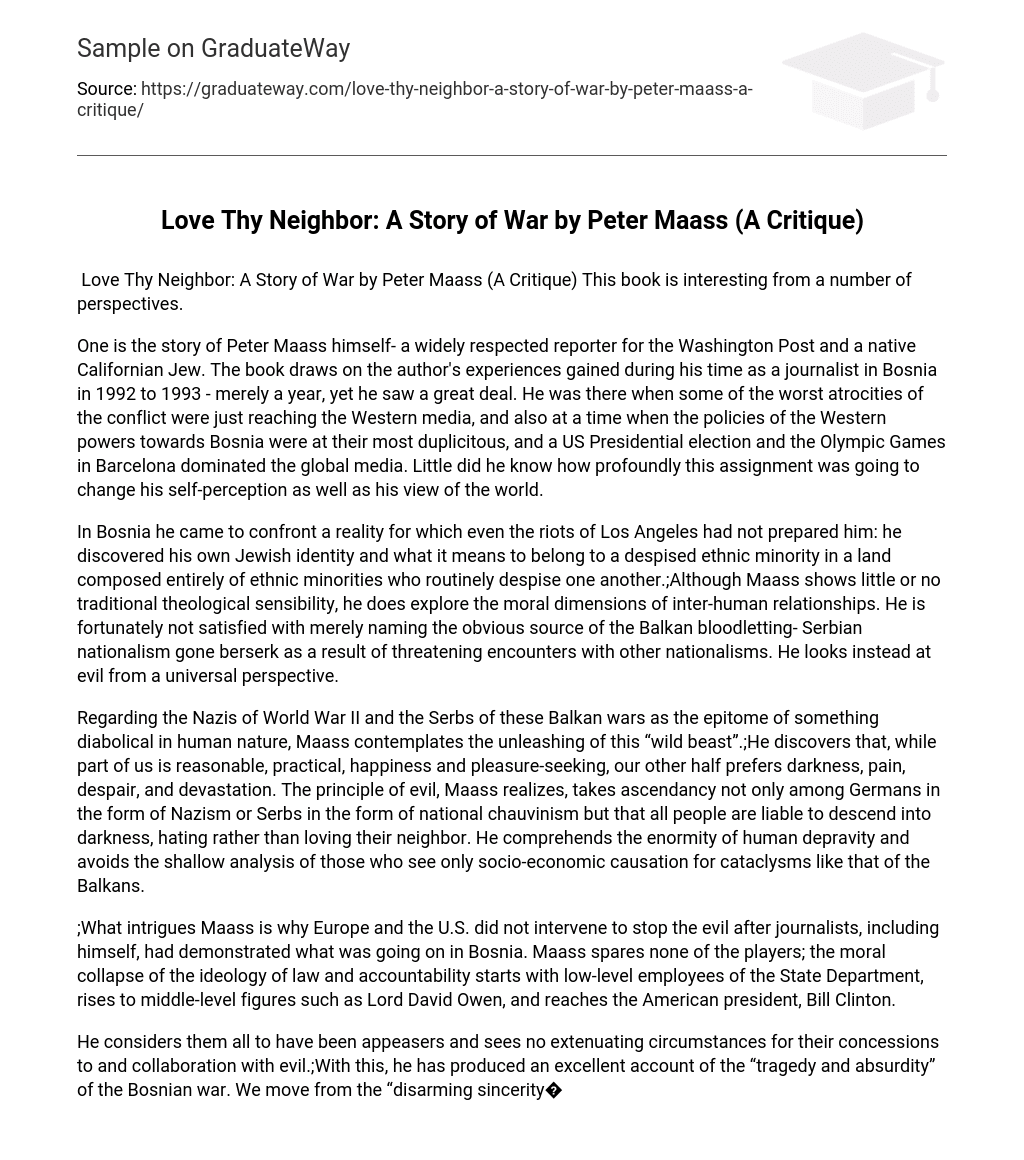One is the story of Peter Maass himself- a widely respected reporter for the Washington Post and a native Californian Jew. The book draws on the author’s experiences gained during his time as a journalist in Bosnia in 1992 to 1993 – merely a year, yet he saw a great deal. He was there when some of the worst atrocities of the conflict were just reaching the Western media, and also at a time when the policies of the Western powers towards Bosnia were at their most duplicitous, and a US Presidential election and the Olympic Games in Barcelona dominated the global media. Little did he know how profoundly this assignment was going to change his self-perception as well as his view of the world.
In Bosnia he came to confront a reality for which even the riots of Los Angeles had not prepared him: he discovered his own Jewish identity and what it means to belong to a despised ethnic minority in a land composed entirely of ethnic minorities who routinely despise one another.;Although Maass shows little or no traditional theological sensibility, he does explore the moral dimensions of inter-human relationships. He is fortunately not satisfied with merely naming the obvious source of the Balkan bloodletting- Serbian nationalism gone berserk as a result of threatening encounters with other nationalisms. He looks instead at evil from a universal perspective.
Regarding the Nazis of World War II and the Serbs of these Balkan wars as the epitome of something diabolical in human nature, Maass contemplates the unleashing of this “wild beast”.;He discovers that, while part of us is reasonable, practical, happiness and pleasure-seeking, our other half prefers darkness, pain, despair, and devastation. The principle of evil, Maass realizes, takes ascendancy not only among Germans in the form of Nazism or Serbs in the form of national chauvinism but that all people are liable to descend into darkness, hating rather than loving their neighbor. He comprehends the enormity of human depravity and avoids the shallow analysis of those who see only socio-economic causation for cataclysms like that of the Balkans.
;What intrigues Maass is why Europe and the U.S. did not intervene to stop the evil after journalists, including himself, had demonstrated what was going on in Bosnia. Maass spares none of the players; the moral collapse of the ideology of law and accountability starts with low-level employees of the State Department, rises to middle-level figures such as Lord David Owen, and reaches the American president, Bill Clinton.
He considers them all to have been appeasers and sees no extenuating circumstances for their concessions to and collaboration with evil.;With this, he has produced an excellent account of the “tragedy and absurdity” of the Bosnian war. We move from the “disarming sincerity” of the mendacious Bosnian Serb leader Radovan Karadzic to the desperate and angry Bosnian vice president Ejup Ganic and the “evil genius” of the war, Serbian President Slobadan Milosevic. Maass concludes in profound sympathy with the Muslims, whose “fatal mistakes” were to discount the threat to their minority status and to believe that the “wild beast had been tamed.
” This attitude sustains a passion that may breach the “respectable distance” of professional journalism while it questions whether such distance is compatible with exceptional reporting.;Most of the book deals with the experiences of the Bosnian Muslims. That this was a disillusioning and morale-sapping time for the author, and many of his colleagues, confronted day after day with the terrible consequences of the conflict, is clearly, and gracefully conveyed.;Good people, caught in horrific circumstances come and go across the pages in what ends up as a litany of shame for not only those implicated, but for all of us who did not protest.
It is a powerful and poignant commentary on a sad episode of human history, posing important questions that often have no answers.Maass questions his own motivations for being there at all and admits with disarming candor that “covering a war can do good things for a young journalist’s career”. This tension between the author’s sense of humanity and his sense of duty to his employer is a key theme in his text. But it is upon the media as an industry that he reserves some of his major criticisms, especially for its fascination for what he calls “warporn”.
This involves the treatment of real-life horror as a kind of macabre entertainment, the snappy editing of such abominations as the infamous Breadline Massacre, for example, to make it seem more like a Schwarzeneger movie than reality. In his view, “the agony of Bosnia was being turned into a snuff film”.Maass is also very critical of the so-called international “community” for their attitudes towards the disaster of Bosnia. The fabrications used by the UN, Europe, the US, and Australia, blaming the Bosnians for bombing themselves and casting Bosnian Muslims as fundamentalist aggressors driven by a jihad mentality.
Peter Maass is bracingly blunt and clear-sighted, his tone deeply passionate and emphatically partisan. He took a journey and abandoned the traditional journalistic impulse against injecting one’s self into the story so people could put themselves into his shoes, his heart, and into his mind. Maass has achieved the synthesis of historical fact and raw emotion that makes his view of events in Bosnia a compelling page-turner. If a reader were to pick up just one book on Bosnia, this is it.
His writing is most effective when describing the frustration of Western journalists risking their lives in a brutal war that nobody at home seemed to care about.





